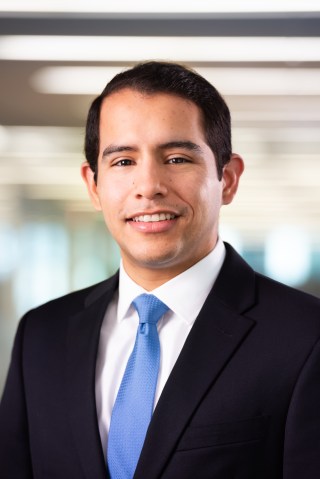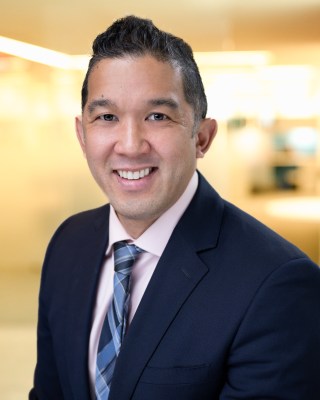
Amid ongoing reports of racially motivated threats and attacks against Asians in the United States, a majority of Asian Americans say violence against them is increasing, according to a new Pew Research Center survey. Most Asian Americans also worry about being threatened or attacked, with a third saying they have changed their daily routine because of these concerns.
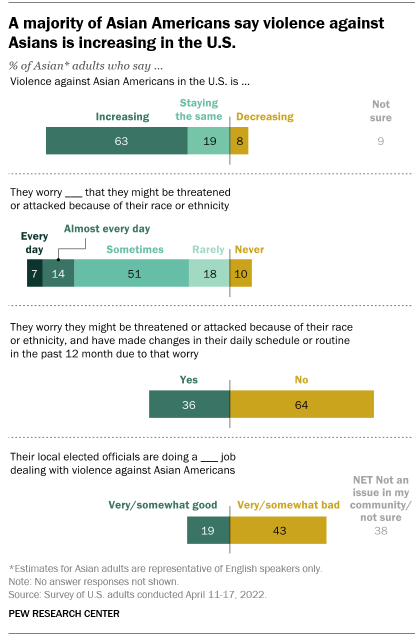
Overall, about six-in-ten Asian adults (63%) say violence against Asian Americans in the U.S. is increasing, while 19% say there has not been much change and 8% say it is decreasing. This is down somewhat since last year, when 81% of Asian Americans said violence against them was increasing.
In an open-ended question that accompanied the 2021 survey, a majority of those who perceived rising violence against Asian Americans attributed it to former President Donald Trump, racism, COVID-19 and its impact on the nation, and scapegoating and blaming Asian people for the pandemic.
In the new survey, about one-in-five Asian Americans say they worry daily (7%) or almost daily (14%) that they might be threatened or attacked because of their race or ethnicity, while 51% say they worry sometimes, 18% rarely worry and 10% say they never worry.
Pew Research Center conducted this study to understand the extent of discrimination experienced by Asian Americans and other groups, as well as their perceptions of violence against Asian people. For this analysis, we surveyed 10,156 U.S. adults, including 365 Asian adults, from April 11 to 17, 2022, using Pew Research Center’s American Trends Panel (ATP), an online survey panel that is recruited through national, random sampling of residential addresses. This way nearly all U.S. adults have a chance of selection. The survey is weighted to be representative of the U.S. adult population by gender, race, ethnicity, partisan affiliation, education and other categories. Read more about the ATP’s methodology.
The survey was fielded about one year after the COVID-19 Hate Crimes Act was signed into law, which aimed to make it easier to report hate crimes at the local and state levels. The law was drafted in response to an increase on assaults against Asian Americans during the coronavirus pandemic, including a March 16, 2021, mass shooting in the Atlanta area in which six women of Asian descent were killed.
All racial groups shown in this analysis refer to single-race, non-Hispanic populations. Hispanics are of any race. Asian adults were interviewed in English only.
Here are the questions used for this analysis, along with its responses and its methodology.
CORRECTION (May 17, 2022): In a previous version of this post, the survey field dates above were incorrect by one day.
The survey includes a total sample size of 365 Asian adults. The sample primarily includes English-speaking Asian adults and, therefore, may not be representative of the overall Asian population (75% of our weighted Asian sample was born in another country, compared with 77% of the Asian adult population in the U.S. overall). Despite this limitation, it is important to report the views of Asian Americans on the topics in this study. Because of the relatively small sample size and a reduction in precision due to weighting, we are not able to analyze Asian respondents by demographic categories such as gender, age, or education. For more, read “Polling methods are changing, but reporting the views of Asian Americans remains a challenge.”
Among those who worry rarely or more often, about a third of Asian adults (36%) say they have altered their daily schedule or routine in the past 12 months due to worries that they might be threatened or attacked.
Asian Americans also say community leaders could be doing more to protect people. More Asian American adults give their local officials a bad rating than a good one when it comes to addressing violence against Asian Americans (43% vs. 19%). One-in-five (20%) say violence against Asian Americans is not an issue in their community, and 18% say they are not sure about the job local officials are doing.
The survey was conducted April 11 to 17, 2022, about a year after the fatal shooting of eight people, including six women of Asian descent, in the Atlanta area. Soon after the incident, President Joe Biden announced actions to address anti-Asian violence and signed into law a measure aiming to curb hate crimes.
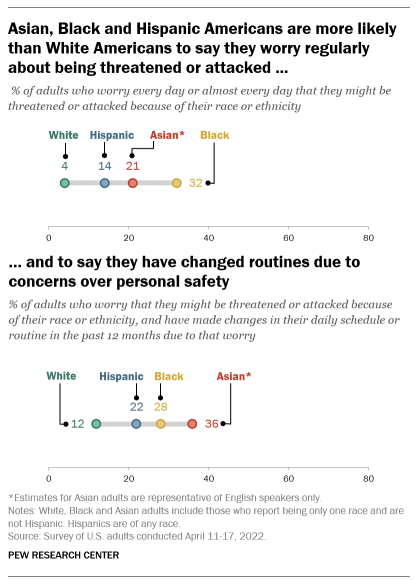
Asian Americans are not the only ones who fear for their safety, the survey finds. Around a third of Black adults (32%) and 14% of Hispanic adults say they worry every day or almost every day that they might be threatened or attacked due to their race or ethnicity, compared with just 4% of White adults.
Concerns over personal safety have disrupted the daily lives of other Americans, too. Around three-in-ten Black adults (28%) say they have made changes in their schedule or routine due to worry of threats or attacks because of their race or ethnicity, and 22% of Hispanic Americans say the same. Among White adults, 12% say they have done this.
Asian adults more likely to see rising violence against Asian Americans, give local officials negative marks
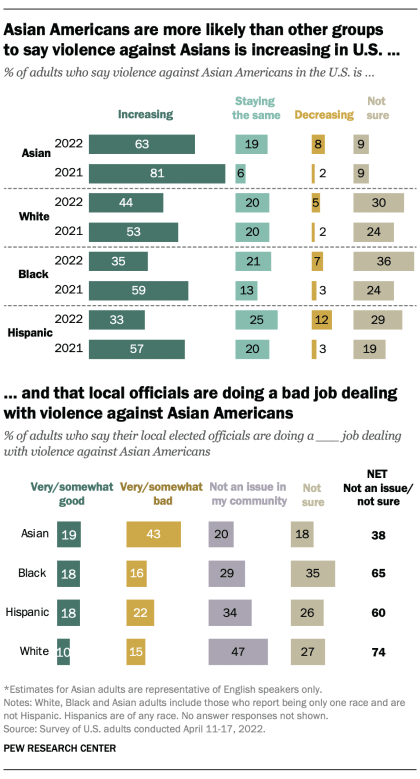
Asian American adults are more likely than other racial or ethnic groups say violence against Asian Americans is increasing. While roughly two-thirds of Asian adults say violence against Asian Americans is increasing, fewer than half of White (44%), Black (35%) and Hispanic (33%) adults say the same.
Across all major racial or ethnic groups, fewer adults now say violence against Asian Americans is increasing than did so in last year’s survey. In April 2021, 81% of Asian adults and about half or more of Black (59%), Hispanic (57%) and White (53%) adults said violence against Asian Americans was increasing.
In the new survey, Asian Americans are also more likely than people in other racial or ethnic groups to give their local elected officials negative marks when it comes to dealing with violence against Asian Americans. While around four-in-ten Asian American adults (43%) say local officials are doing a very or somewhat bad job in this respect, smaller shares say this among Hispanic (22%), Black (16%) and White (15%) adults. Majorities of Hispanic (60%), Black (65%) and White (74%) adults say they are not sure about the job their local officials are doing dealing with violence against Asian Americans, or that such violence is not an issue in their community.
What do Asian Americans say should be done?
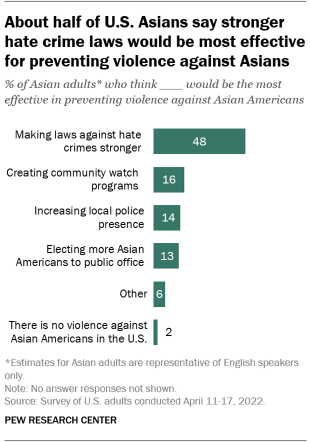
When asked to select among measures that might help prevent violence against Asian Americans, about half of Asian American adults (48%) say making laws against hate crimes stronger would be the most effective policy. Smaller shares of Asian Americans say the same about creating community watch programs (16%), increasing local police presence (14%) and electing more Asian Americans to public office (13%).
Note: Here are the questions used for this analysis, along with its responses and its methodology.
